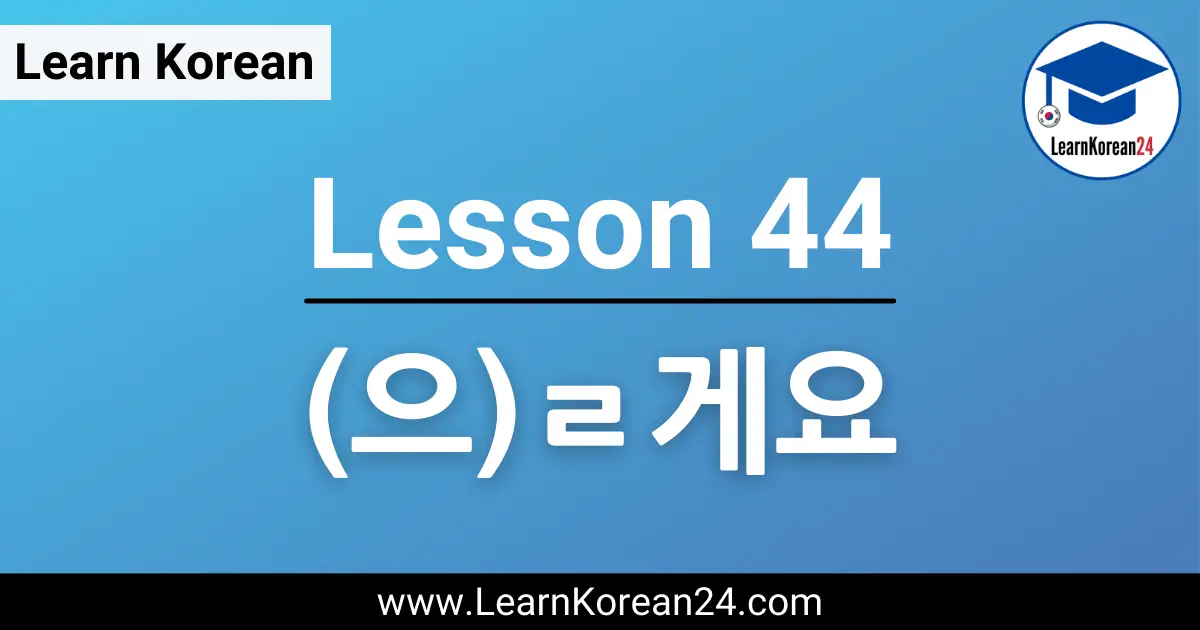Lesson 44: (으)ㄹ게요
In this lesson, you will learn how to use the ending (으)ㄹ게요 to express the speaker’s decision, intention, or promise to do something for another person. By the end of this lesson, you will be able to say things like “I’ll call you later.“, “I’m leaving now.“, etc.
Lesson 44: (으)ㄹ게요
The ending (으)ㄹ게요 is similar to ‘I will’ in English and expresses the speaker’s decision or intention (e.g., “I’ll do it.“), or their promise to do something for the listener’s benefit (e.g. “I’ll buy the coffee.“). When the speaker is promising to do something for the listener’s benefit, then (으)ㄹ게요 is similar to saying ‘Let me‘ in English (e.g. “Let me buy the coffee.“). Let’s look at some examples:
가다 = to go
먼저 갈게요. = I’ll leave first. / I’m leaving first.
사다 = to buy
커피를 살게요. = I’ll buy the coffee. / Let me buy the coffee.
먹다 = to eat
잘 먹을게요. = I will enjoy eating it. (This is what Koreans say before eating.)
기다리다 = to wait
밖에서 기다릴게요. = I will wait outside.
전화하다 = to call
이따가 전화할게.* = I will call you later.
도와주다 = to help
도와줄게요. = I’ll help you. / Let me help you.
*In a casual, non-polite sentence, (으)ㄹ게 is used, but in most situations, you should use (으)ㄹ게요 in order to sound polite.
Conjugation Rules
(으)ㄹ게요 is only attached to verbs, not to adjectives. When attaching (으)ㄹ게요 to verbs, you must choose either 을게요 or ㄹ게요. The one you use depends on whether the verb ends in a consonant or a vowel. See the table below.
| Conjugation Rule | Examples |
|---|---|
| Verb Stem Ends In Consonant + 을게요 | 먹다 (to eat) → 먹을게요 |
| Verb Stem Ends In Vowel + ㄹ게요 | 사다 (to buy) → 살게요 |
| <Irregular Conjugations> | 열다 (to open) → 열게요 만들다 (to make) → 만들게요 듣다 (to listen) → 들을게요 걷다 (to walk) → 걸을게요 |
(으)ㄹ게요 VS (으)ㄹ 거예요
If you remember from Lesson 21, (으)ㄹ 거예요 is used to express the future tense and means ‘will’ or ‘going to’. The ending (으)ㄹ게요 from this lesson also expresses the future tense and means ‘will’ or ‘going to’. So what’s the difference between (으)ㄹ게요 and (으)ㄹ 거예요?
Both (으)ㄹ게요 and (으)ㄹ 거예요 are used to express the speaker’s plan, decision, or intention. The difference between these two is that (으)ㄹ게요 is used when the speaker’s decision is a reaction to, or as a result of, what the other person says or thinks. To help you understand what we mean, check out the following dialogues:
이 케이크 좀 드세요. 제가 직접 만들었어요. = Try this cake. I made it myself.
감사합니다. 잘 먹을게요. = Thank you. I will enjoy it.
As you can see in this dialogue, the speaker says 잘 먹을게요 (“I’ll eat well” / I’ll enjoy it“) in response to the other person saying “try this cake“. And so, in this sentence (으)ㄹ게요 is used.
오늘 저녁에 뭐 먹을 거예요? = What are you going to eat for dinner?
이탈리아 음식을 먹을 거예요. = I will eat Italian food.
As you can see in this example, the speaker’s plan/intention to eat Italian food has nothing to do with the other person in the conversation. And so, (으)ㄹ 거예요 is used.
Things To Note
In a sentence using the ending (으)ㄹ게요, the subject must be the first person.
제가 이따가 전화할게요. = I will call you later. (O)
마이클 씨가 이따가 전화할게요. = Michael will call you. (X)
Another thing to note is that (으)ㄹ게요 is used only in statements, not in questions.
밖에서 기다릴게요. = I’m going to wait outside. (O)
밖에서 기다릴게요? = Are you going to wait outside? (X)
Example Sentences
다음에 또 봐! = See you later!
그래. 연락할게. = OK. I will be in touch.
이거 너무 어려워요! 도와줄 수 있어요? = This is so difficult! Can you help me?
그럼요. 도와줄게요. = Sure. Let me help you.
죄송합니다. 일이 있어서 먼저 갈게요. = Sorry. I have work to do, so I’ll leave first.
벌써요? 알았어요. 잘 가요! = Already? Okay. See you!
여기 도착했어요. 어디예요? = I just arrived here. Where are you?
지금 가고 있어요. 빨리 갈게요. = I’m coming now. I’ll be there soon.
지금 통화할 수 있어? = Can we talk (on the phone) now?
미안. 지금 너무 바빠. 이따가 전화할게. = Sorry. I’m too busy now. I will call you later.
방금 이메일 보냈어요. 확인해 주세요. = I sent you an email just now. Please check it for me.
네. 그럴게요. = OK. I will.
*Instead of (으)ㄹ게요, 그럴게요 can be used when promising to do something the other person requested. 그럴게요 literally means ‘I will do so’.
STUDY ONLINE WITH KOREAN ARAH!
Ready to take your Korean to the next level?
Get One-on-One Korean lessons from a qualified and experienced Korean language tutor!

